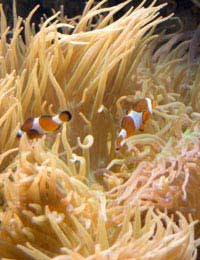Saltwater Fish Disease

Every aquarist fears disease but treating outbreaks in your marine aquarium can be all the more difficult. How can you spot developing illness and what are the best ways to treat it without damaging your marine ecosystem?
Tropical marine fish are often particularly vulnerable to disease because of stress caused by being transported over long distances, especially if they have been taken from the ocean. Adjusting to aquarium life can also prove difficult and the stress involved can lower the immune system. Always ask your fish shop to order captive bred fish for you and you can avoid this problem. Avoiding wild-caught fish also means that you avoid the risk of introducing disease organisms from the ocean into your aquarium.
As with all fish diseases, the best option is not treatment but prevention. Maintaining stable water parameters well suited to the needs of your fish, using good filtration and selecting fish that get along well will vastly reduce the risk of disease outbreaks. Provide a suitable habitat, avoid overcrowding and supply suitable, nutritious food, and your fish should enjoy good health most of the time.
Detecting Disease
Despite all your precautions, it is inevitable that things will sometimes go wrong. When they do, the sooner you can treat your fish, the better their chances of survival will be. As always, good aquarium management requires paying attention. Look out for fish whose colours have faded, who are breathing more slowly or more rapidly than usual, who are behaving listlessly or who are suddenly being bullied by other fish. Odd swimming motions, scratching and folded-down fins can also be signs of trouble. If you notice symptoms like these, consider isolating the affected fish as you try to work out exactly what is wrong.When treating disease with medication, it is always best to do so in an isolation tank. This is especially important with marine fish as many marine organisms can be poisoned by copper-based medicines and other useful treatments.Common Saltwater Fish Diseases
Many of the medicines used to treat saltwater fish diseases are highly toxic. Overexposure can harm your fish, so you should always be very careful about getting the dose right. Most commercial preparations come with guides to make this easier. If you are uncertain about using such treatments or are unsuccessful in treating disease outbreaks, contact your local vet. Many vets are willing to treat fish or can refer you to specialists who will. Vets also have access to antibiotics which you may not be able to buy over the counter.
Although disease is something which happens in almost every aquarium sooner or later, it doesn't have to be a disaster. Good aquarium management and prompt treatment when problems arise will give your fish a good chance of living long, healthy lives.
- Create an Ethical Aquarium
- Starting an Aquarium from Scratch
- Euthanasia for Fish
- Caring for Baby Fish
- Introducing New Fish Into Your Tropical Fish Tank
- Snail Infestations in Your Fish Tank
- Adding Accesories To Your Tropical Fish Tank
- Tropical Fish Tank Security
- Dealing with Bullying Between Fish
- Transporting Fish
- Rescue Solutions
- Choosing The Right Fish For Your Aquarium
- Water Quality
- How To Detect Fish Diseases And Injuries
- Tropical Fish Anatomy
- Livebearers
- Breeding Fish
- Freshwater Fish Disease


Re: Providing Toys for Your Fish
Toys for my baby Flowerhorn fish??? And where to buy them ?
Re: Snail Infestations in Your Fish Tank
My coy fish just started darting and running into the glass. I've checked them over and see nothing on the outside of…
Re: My Pet Fish is 20 Years Old is this a Record?
I purchased a gold fish on April 1997 for my daughters and the same fish is alive and well. The reason I'm…
Re: Dealing with Bullying Between Fish
I have 3 Bolivian butterfly rams not sure the genders,but at the start all 3 were fine but just recently we’ve notice 2…
Re: Using Electrical Devices Safely In Your Aquarium
Monthly water changes isn’t enough I would be changing at least a 1/3 weekly. I do it more often than…
Re: Dealing with Bullying Between Fish
I have a blue gourami that has been living with 4 platty’s and a yoyo loach. I noticed a couple of my fish missing. I…
Re: Lighting for Aquatic Animals
Will a UV submersible light harm my tropical tank and fish. Thanks for any help
Re: Dealing with Bullying Between Fish
Recently put 12 new Africans in my 55 gallon tank. Many rocks and hiding places. After 2,3 days one of them, obliquidens,…
Re: Food Quantities
Just noticed smallest neon tetra tail is missing and white on the edges. Another also has half of tail missing. They was OK a few days ago. I only…
Re: Providing Toys for Your Fish
I have guppies and I think the ideas for toys might be too big, I have tried training them but they aren't responding.